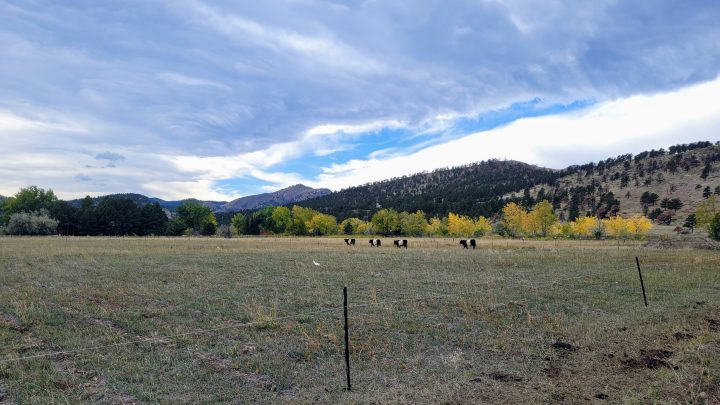
To fund climate-friendly agriculture, farmers seek financial support from restaurants
To fund climate-friendly agriculture, farmers seek financial support from restaurants

At Nick DiDomenico’s farm in rural Longmont, Colorado, cows graze in the shadow of the Rocky Mountain Foothills. “We’re farming here, we’re running our cattle,” DiDomenico said.

DiDomenico is pushing the boundaries of regenerative agriculture. It’s an approach to farming and ranching that rebuilds depleted soils and mitigates climate change by putting carbon back in the ground. Farmers are increasingly experimenting with it.
For DiDomenico, that means he’s doing things like planting trees and adding compost. “Imagine 277 yards of compost,” he said. “That was like 50 trucks or something.”
All that compost costs money. Of course, farming is expensive even when it’s conventional. And since the 1930s, the federal government has subsidized agriculture heavily. But the more unconventional the farm, the trickier it is to get federal funding.
So instead, DiDomenico finds financial support in some unlikely places. He gets funding from restaurants — like a Subway sandwich shop in a strip mall in the nearby city of Boulder.
It might seem like a million miles from DiDomenico’s bucolic pastures. But this Subway contributes a 1% charge on its sales to support the regenerative farming fund Zero Foodprint.
Tim Schiel is the owner of this Subway franchise and three others in Boulder. He signed onto Zero Foodprint because he grew up in farm country and said he understands that his livelihood depends on healthy soils.
“You know, obviously 1% is not much and if you can do that in mass, obviously, it really adds up in a hurry,” he said.
Anthony Myint, a celebrated chef with popular restaurants in San Francisco, created Zero Foodprint.

“The program is really trying to just give consumers what they want,” Myint said, “which is a way to make a sustainable choice, have a local impact.”
Back on the farm, Nick DiDomenico said he is seeing that local impact: He’s received $15,000 from Zero Foodprint so far.
“Cities and urban areas basically draw resources out of rural areas,” he said, “whether it be food, gas, commodities, people, whatever it is.”
This, DiDomenico added, is a way to bring resources back to the farms and channel them directly into the land.
There’s a lot happening in the world. Through it all, Marketplace is here for you.
You rely on Marketplace to break down the world’s events and tell you how it affects you in a fact-based, approachable way. We rely on your financial support to keep making that possible.
Your donation today powers the independent journalism that you rely on. For just $5/month, you can help sustain Marketplace so we can keep reporting on the things that matter to you.


















